
Mastering Summer Lawn Care: Essential Tips to Keep Your Grass Green and Healthy
Summer is a time of joy and outdoor activities, but it can also be a challenging period for your lawn. The heat, drought, and increased use can stress your grass, leading to a less than perfect appearance. But don’t worry! This article will provide you with essential summer lawn care tips to keep your lawn looking its best. We’ll cover everything from watering and mowing to dealing with weeds and pests. So, let’s dive in and learn how to keep your lawn green and beautiful all summer long.
Why is Summer Lawn Care Important?
Summer lawn care is crucial for maintaining a healthy and attractive lawn. During the hot summer months, your lawn is subjected to high temperatures and less water, which can lead to brown, dry, and lifeless grass. Proper summer lawn care can help prevent this, ensuring your lawn stays green and lush throughout the season.
How Often Should You Water Your Lawn in Summer?
Watering is a critical aspect of summer lawn care. During the hot summer months, it’s best to water your lawn deeply and less frequently. Aim for about 1 inch of water per week, which should soak the soil to a depth of 4 to 6 inches. Watering in the early morning or late evening can reduce evaporation and ensure the water reaches the grass roots.
What is the Best Way to Mow Your Law?
Mowing your lawn correctly during the summer can help it withstand the heat and stay green. Mow your lawn high, as taller grass develops deeper roots that are better at seeking out water underground. Also, a taller lawn can shade the soil and keep it cooler, reducing water evaporation.

How Can Fertilizer Help Your Lawn in Summer?
Fertilizing your lawn in the early summer can strengthen it to better withstand the heat and drought conditions. Apply a slow-release fertilizer that will feed your grass throughout the summer. However, be careful not to over-fertilize, as this can burn your grass.
How to Deal with Weeds in Your Lawn?
Weeds can be a significant problem in summer. They compete with your grass for water and nutrients, and can quickly take over your lawn if not controlled. Spot-treat any weeds that appear using a specific weed control product. This will kill the weeds without harming your grass.
What About Lawn Pests?
Summer is also a time when lawn pests, such as grubs, can become a problem. These pests can cause significant damage to your lawn by eating the roots of your grass. If you had a grub problem in the previous year, treat your lawn in the early summer to prevent a recurrence.
Should You Leave Grass Clippings on Your Lawn?
After mowing, it’s beneficial to leave the clippings on your lawn. They will break down and return valuable nutrients to the soil, helping to feed your grass. This is a simple and effective way to keep your lawn healthy and reduce the need for additional fertilizers.

How to Care for Your Lawn in Late Summer?
As the summer progresses, continue to water and mow your lawn as needed. However, you may need to adjust your watering schedule if rainfall increases. Also, keep an eye out for any signs of disease or pest infestations, which can become more prevalent in late summer.
Can You Enjoy Your Lawn Without Damaging It?
Yes, you can! While it’s important to avoid excessive traffic on your lawn during the hot summer months, you can still enjoy your outdoor space. Just be mindful of where you place lawn chairs and other items, and try to move them regularly to prevent damage to the grass underneath.
In conclusion, caring for your lawn during the summer involves a combination of proper watering, mowing, fertilizing, and weed and pest control. Here are the key points to remember:
Water your lawn deeply and less frequently, aiming for about 1 inch of water per week.
Mow your lawn high to help it develop deeper roots and shade the soil.
Fertilize your lawn in the early summer to help it withstand the heat and drought.
Spot-treat any weeds that appear to prevent them from taking over your lawn.
Treat for grubs in the early summer if you had a problem with them in the previous year.
Leave grass clippings on your lawn after mowing to return valuable nutrients to the soil.
Adjust your lawn care practices as needed in late summer, and keep an eye out for signs of disease or pest infestations.
Enjoy your lawn, but avoid excessive traffic and be mindful of where you place items.
By following these summer lawn care tips, you can keep your lawn looking its best all summer long, providing a beautiful and enjoyable outdoor space for you and your family.
Colin Macmillan is a seasoned entrepreneur and the CEO of Riverwood Landscape, a leading landscaping company based in Canada. He has been at the helm of the company since leaving high school, demonstrating his strong leadership skills and business acumen.
Colin’s expertise lies in various aspects of landscaping, including lawn care, interlocking, sod installation, and commercial maintenance. His hands-on approach and dedication to the craft have been instrumental in building Riverwood Landscape into a reputable brand.
One of his most notable achievements is the creation of a successful landscape franchise that services multiple locations. This accomplishment underscores his strategic thinking and ability to scale operations effectively.
Colin has also had the privilege of working with Guelph Hospital for landscaping and maintenance, a testament to the trust and reliability that his company has earned over the years.
His professional mission is to offer the best services and experiences for customers, a goal that he tirelessly pursues. Colin’s commitment to excellence and customer satisfaction continues to drive the growth and success of Riverwood Landscape.








